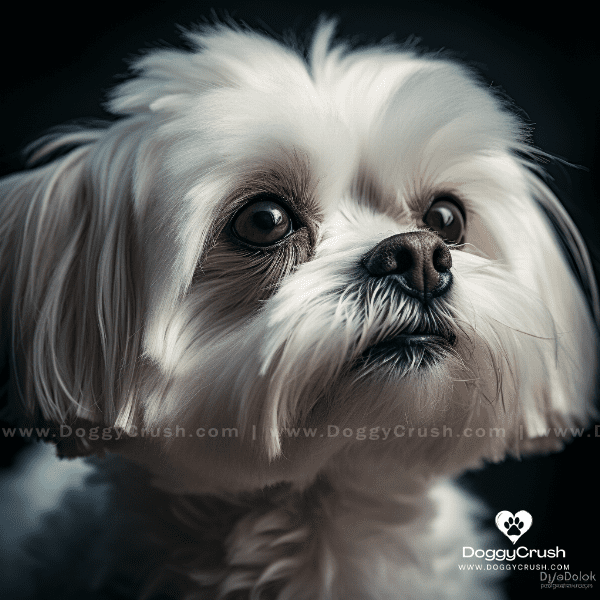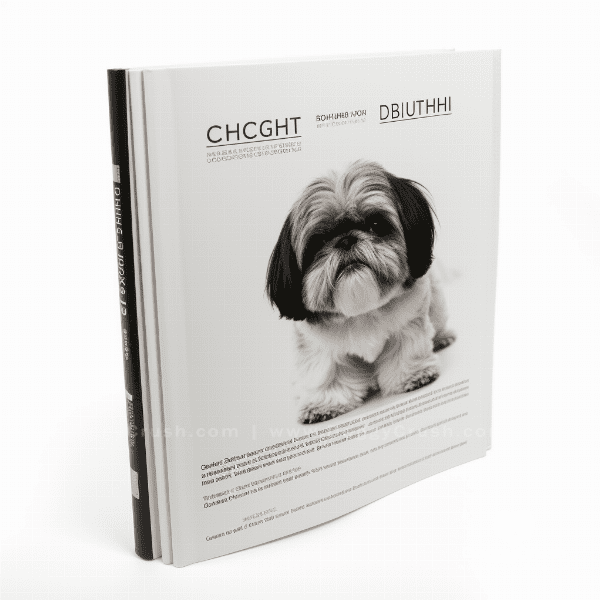Table of Contents
- History and Origin of Maltese Dogs
- Appearance and Characteristics of Maltese Dogs
- Temperament and Personality of Maltese Dogs
- Grooming and Care for Maltese Dogs
- Training and Exercise for Maltese Dogs
- Common Health Issues of Maltese Dogs
- Feeding and Nutrition for Maltese Dogs
- Socialization and Interaction with Other Dogs and People
- Finding and Choosing a Maltese Puppy or Adult Dog
- Conclusion: Is a Maltese Dog Right for You?
History and Origin of Maltese Dogs
Maltese dogs are an ancient breed that has been around for over 2,000 years. While their exact origins are unknown, it is believed that they were first bred on the Mediterranean island of Malta, which is where they get their name.
Trade Routes and Influences
Malta has been a major hub for trade and commerce for centuries, and it is likely that the Maltese dog was developed through a combination of various breeds brought to the island by traders and explorers. Phoenician traders are believed to have brought small, white dogs to Malta as early as the 8th century BC, and the breed continued to evolve over the centuries as different cultures and influences came and went.
Royalty and Aristocracy
Throughout history, Maltese dogs have been highly prized by royalty and aristocracy. The breed was a favorite of Queen Elizabeth I of England, who owned several Maltese dogs and was said to have been so attached to them that she took them everywhere with her, even to court.
In the 19th century, Maltese dogs became popular in Europe, and they were often given as gifts to royalty and nobility. The breed was also popular among wealthy Americans, and Maltese dogs were often seen in the arms of fashionable ladies in New York and other cities.
Modern Times
Today, the Maltese dog remains a popular breed around the world. While they are no longer just the pets of the rich and famous, they still retain their regal and elegant demeanor. They are often seen in dog shows and competitions, and they make excellent companions for those looking for a small, affectionate, and loyal pet.
In conclusion, the Maltese dog has a rich history and has been beloved by people for centuries. Their origins are a bit mysterious, but their status as a beloved companion animal is clear. Whether you’re a fan of their regal history or just love their cute and cuddly appearance, the Maltese dog is a breed that is sure to capture your heart.
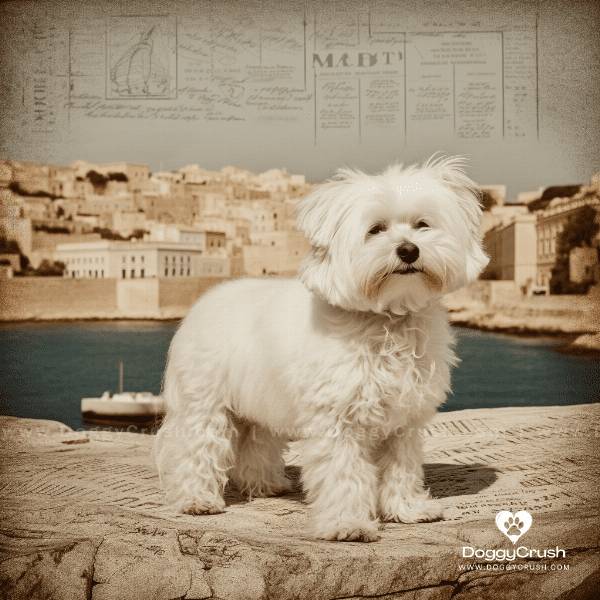
Appearance and Characteristics of Maltese Dogs
Maltese dogs are small and compact dogs, typically weighing between 4 and 7 pounds. They are known for their long, silky white hair, which can be quite impressive when properly groomed. Here are some other characteristics that make the Maltese dog unique:
Head and Body
The head of a Maltese dog is round, with a short snout and drop ears. Their eyes are round and dark, and they have a black nose. The body of a Maltese is compact and balanced, with a level topline and a high-set tail that curls over their back.
Coat
The coat of a Maltese dog is one of their most distinguishing features. It is long, silky, and straight, and can grow up to 10 inches in length. The coat is pure white and is hypoallergenic, making it a good choice for people with allergies.
Temperament
Maltese dogs are known for their affectionate and playful nature. They love to be around people and are very loyal to their owners. They are also intelligent and eager to please, which makes them easy to train.
Health
Like all breeds, Maltese dogs can be prone to certain health issues. Some of the most common issues include dental problems, luxating patella, and eye problems. It is important to keep up with regular vet visits and to be aware of any potential health issues.
Lifespan
Maltese dogs have a relatively long lifespan compared to other small Dog breeds. They can live up to 15 years or more with proper care and attention.
In conclusion, the Maltese dog is a small and elegant breed known for their beautiful coat, affectionate nature, and long lifespan. While they may require some grooming and attention, they make excellent companions for those looking for a loyal and loving pet.
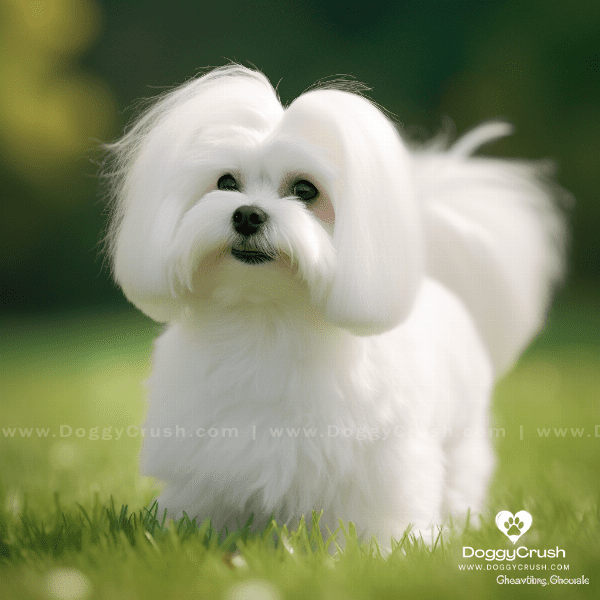
Temperament and Personality of Maltese Dogs
Maltese dogs are known for their sweet and affectionate nature. They are friendly, outgoing, and love to be around people. Here are some other characteristics that make the Maltese dog’s temperament and personality unique:
Affectionate
One of the defining characteristics of the Maltese dog is their affectionate nature. They love to be around people and will often follow their owners from room to room. They are happiest when they are with their family and are not a breed that does well when left alone for long periods of time.
Playful
Maltese dogs are also known for their playful nature. They love to play games and will often initiate play with their owners or other dogs. They are energetic and agile, and will often jump and run around when they are excited.
Alert
While Maltese dogs are friendly and outgoing, they are also quite alert. They make good watchdogs and will bark to let their owners know if someone is at the door or if they hear a noise outside.
Intelligent
Maltese dogs are intelligent and eager to please, which makes them easy to train. They respond well to positive reinforcement training and enjoy learning new tricks and commands.
Adaptability
Maltese dogs are adaptable and can do well in a variety of living situations. They are good apartment dogs and do not require a lot of space. They are also good with children and other pets, making them a great choice for families.
In conclusion, the Maltese dog’s temperament and personality are what make them such beloved pets. They are affectionate, playful, alert, intelligent, and adaptable. If you’re looking for a loyal and loving companion, the Maltese dog might be the perfect breed for you.
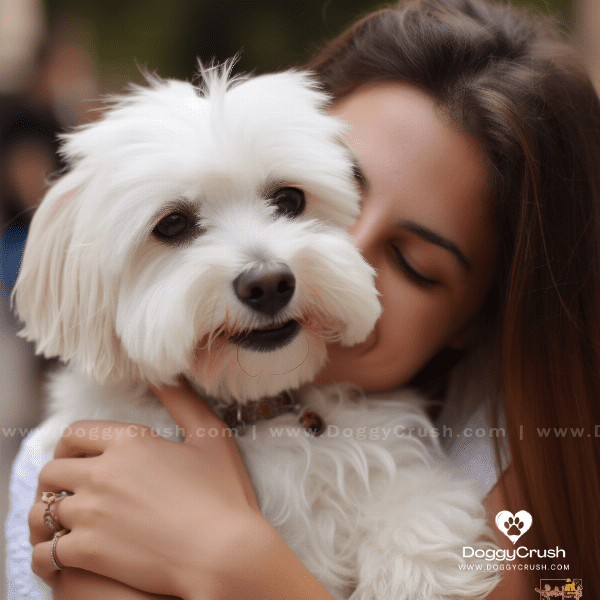
Grooming and Care for Maltese Dogs
Grooming is an important part of caring for a Maltese dog. Their long, silky white coat requires regular maintenance to keep it healthy and clean. Here are some tips on how to groom and care for your Maltese dog:
Brushing
The Maltese coat is prone to matting and tangling, so it’s important to brush your dog regularly to prevent this from happening. Use a slicker brush or a pin brush to gently remove any tangles or mats in the fur. You should also comb through the coat with a metal comb to ensure that there are no knots left behind.
Bathing
Maltese dogs should be bathed every 2-4 weeks, depending on how dirty their coat gets. Use a mild dog shampoo and make sure to rinse all the soap out of their coat thoroughly. After the bath, wrap your dog in a towel and gently pat them dry, being careful not to rub the coat too vigorously.
Trimming
Trimming your Maltese dog’s coat is an important part of grooming. This includes trimming the hair around their eyes, ears, and paws, as well as their underbelly. You can do this at home with a pair of grooming scissors, or you can take your dog to a professional groomer.
Dental Care
Dental care is also important for Maltese dogs. Brush your dog’s teeth regularly with a soft-bristled toothbrush and toothpaste made for dogs. You can also give your dog dental chews or toys to help keep their teeth clean.
Exercise
Maltese dogs are small, but they still require daily exercise to keep them healthy and happy. Take your dog for a walk or play fetch with them in the yard. They also enjoy playing with toys and interacting with their owners.
In conclusion, grooming and care are important aspects of owning a Maltese dog. Regular brushing, bathing, trimming, and dental care are essential for keeping their coat healthy and their teeth clean. In addition, providing your Maltese dog with regular exercise and love and attention will ensure that they live a long and happy life.
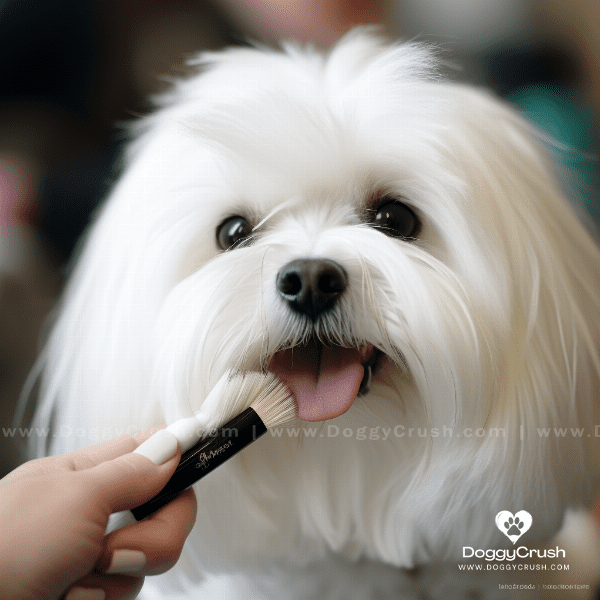
Training and Exercise for Maltese Dogs
Maltese dogs are intelligent and eager to please, which makes them easy to train. Regular exercise is also important for their overall health and well-being. Here are some tips on how to train and exercise your Maltese dog:
Training
Positive reinforcement training is the most effective method for training Maltese dogs. This means rewarding good behavior with treats, praise, and attention. Use a firm and consistent tone when giving commands, and avoid using physical punishment or yelling.
Start with basic commands like “sit,” “stay,” and “come.” Once your dog has mastered these commands, you can move on to more advanced tricks and obedience training.
Exercise
While Maltese dogs are small, they still require daily exercise to keep them healthy and happy. They enjoy short walks, indoor playtime, and games of fetch. They also enjoy mental stimulation, so puzzle toys and interactive games are a great way to keep them entertained.
It’s important not to overexert your Maltese dog, especially in hot weather. Make sure they have access to plenty of water and shade, and avoid exercising them during the hottest parts of the day.
Socialization
Socialization is important for all dogs, including Maltese dogs. Introduce your dog to new people, places, and experiences to help them become well-adjusted and confident. This can include visits to the park, playdates with other dogs, and exposure to different sights and sounds.
Training Tools
There are several training tools that can be helpful when training a Maltese dog, including a crate, a leash, and training treats. A crate can be used for house training and to provide a safe space for your dog when you are away from home. A leash can be used for outdoor exercise and to keep your dog safe when out in public. Training treats can be used to reward good behavior and reinforce positive habits.
In conclusion, training and exercise are important for the health and well-being of your Maltese dog. Positive reinforcement training, regular exercise, and socialization can help your dog become a well-behaved and happy companion. By providing your Maltese dog with love, attention, and proper training and exercise, you can ensure that they live a long and happy life.
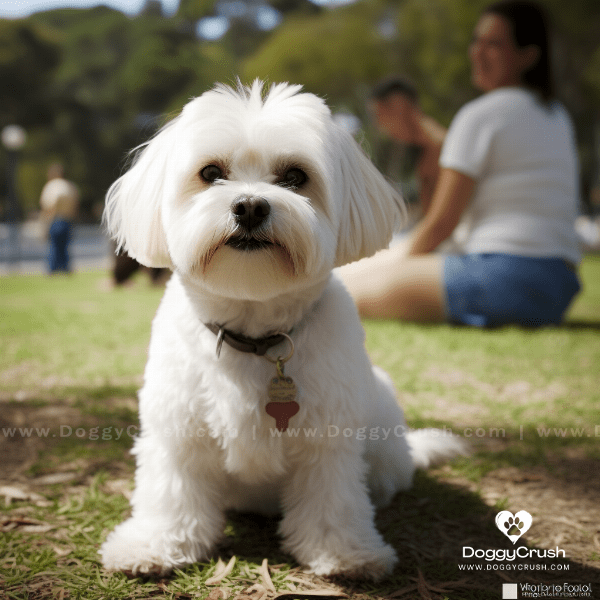
Common Health Issues of Maltese Dogs
Like all breeds, Maltese dogs can be prone to certain health issues. Here are some of the most common health issues that affect Maltese dogs:
Dental Issues
Maltese dogs are prone to dental issues, such as tooth decay, gum disease, and tooth loss. This is due to their small mouths and crowded teeth. It’s important to brush your Maltese dog’s teeth regularly and to take them for regular dental cleanings.
Eye Problems
Maltese dogs can also be prone to eye problems, such as cataracts, corneal ulcers, and dry eye. Signs of eye problems include redness, discharge, and excessive tearing. It’s important to take your dog to the vet if you notice any signs of eye problems.
Patellar Luxation
Patellar luxation is a common condition in small dogs, including Maltese dogs. It occurs when the kneecap becomes dislocated from its normal position. Signs of patellar luxation include limping, skipping, and a reluctance to put weight on the affected leg. Treatment may include surgery or medication.
Hypoglycemia
Hypoglycemia is a condition where the blood sugar levels in a dog’s body become too low. This is common in small dogs, including Maltese dogs, and can be caused by stress, overexertion, or not eating enough. Signs of hypoglycemia include lethargy, seizures, and loss of coordination. It’s important to provide your Maltese dog with frequent small meals throughout the day to prevent hypoglycemia.
White Shaker Syndrome
White shaker syndrome is a condition that affects white dogs, including Maltese dogs. It is characterized by tremors that affect the entire body. The cause of white shaker syndrome is unknown, but it can be treated with medication.
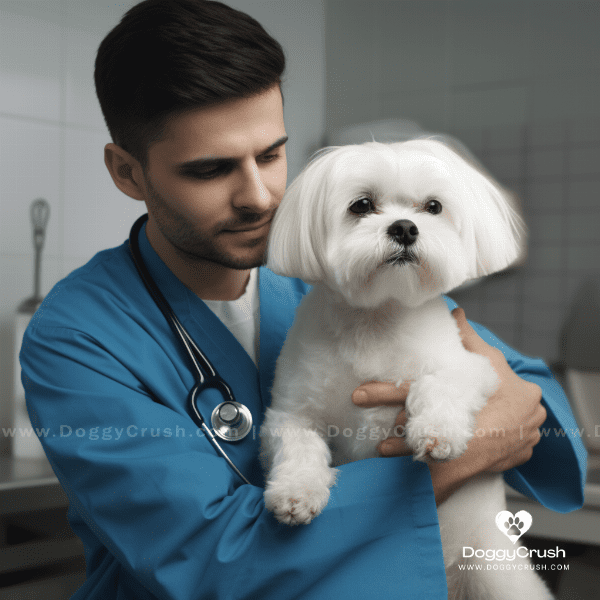
Feeding and Nutrition for Maltese Dogs
Feeding your Maltese dog a healthy and balanced diet is essential for their overall health and well-being. Here are some tips on how to ensure that your Maltese dog is getting the nutrition they need:
High-Quality Dog Food
Choose a high-quality dog food that is specifically formulated for small breeds. Look for a brand that lists real meat as the first ingredient, and avoid brands that contain fillers or artificial preservatives.
Portion Control
Maltese dogs are small and have a relatively low daily caloric requirement. It’s important to feed your dog small, frequent meals throughout the day to prevent overeating and weight gain. Follow the feeding guidelines on the dog food packaging, and adjust the portion size as needed based on your dog’s weight and activity level.
Avoid Table Scraps
Avoid giving your Maltese dog table scraps or human food, as this can upset their stomach and contribute to obesity. Stick to feeding them their regular dog food, and limit treats to occasional rewards for good behavior.
Fresh Water
Make sure that your Maltese dog always has access to fresh, clean water. This is essential for their overall health and hydration.
Special Diets
If your Maltese dog has any special dietary needs or health issues, talk to your vet about a specialized diet. They may recommend a prescription diet or a specific type of food to help manage your dog’s condition.
In conclusion, feeding your Maltese dog a healthy and balanced diet is essential for their overall health and well-being. Choose a high-quality dog food, feed small, frequent meals, avoid table scraps, and provide fresh water. By providing your Maltese dog with proper nutrition and care, you can help ensure that they live a long and healthy life.
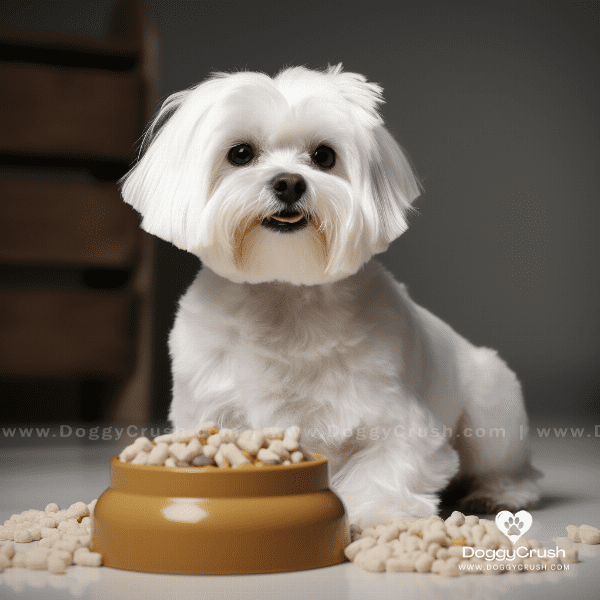
Socialization and Interaction with Other Dogs and People
Socialization is an important part of raising a well-behaved and well-adjusted Maltese dog. Here are some tips on how to socialize your Maltese dog:
Early Socialization
Start socializing your Maltese dog as early as possible. This means exposing them to new people, places, and experiences while they are still young. This will help them become comfortable and confident in a variety of situations.
Positive Reinforcement
Use positive reinforcement to encourage good behavior when your Maltese dog interacts with other dogs and people. Reward them with treats and praise when they exhibit good behavior, such as sitting calmly or approaching someone in a friendly manner.
Dog Parks
Dog parks can be a great place for Maltese dogs to socialize and interact with other dogs. However, it’s important to supervise your dog at all times and make sure that they are comfortable in the environment. Start by introducing them to smaller groups of dogs, and gradually work up to larger groups.
Playdates
Arrange playdates with other dogs and their owners to give your Maltese dog the opportunity to interact in a controlled environment. This can be especially helpful if your Maltese dog is shy or anxious around other dogs.
Training Classes
Enrolling your Maltese dog in obedience or agility classes can be a great way to socialize them and help them develop good behavior around other dogs and people. It can also provide mental stimulation and help keep them active and healthy.
In conclusion, socialization and interaction with other dogs and people are important for the overall well-being of your Maltese dog. Start socializing them early, use positive reinforcement, and provide opportunities for them to interact with other dogs and people. By doing so, you can help your Maltese dog become a well-adjusted and well-behaved companion.
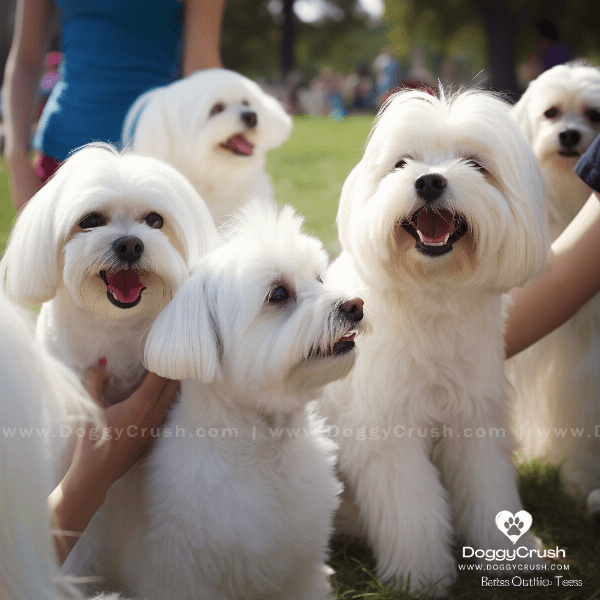
Finding and Choosing a Maltese Puppy or Adult Dog
If you’ve decided that a Maltese dog is the right breed for you, the next step is to find and choose the right puppy or adult dog for your family. Here are some tips on how to do so:
Research
Research the breed and make sure that a Maltese dog is the right fit for your lifestyle and living situation. Maltese dogs are known for their small size, affectionate nature, and hypoallergenic coat, but they also require regular grooming and exercise.
Breeders
If you’re looking for a purebred Maltese puppy, look for a reputable breeder who follows ethical breeding practices. Ask for references and visit the breeder in person to see how the puppies are being raised.
Adoption
Consider adopting a Maltese dog from a shelter or rescue organization. Adult dogs can be just as loving and affectionate as puppies, and adopting can be a great way to give a dog a second chance at a happy life.
Health Checks
Make sure that any Maltese puppy or adult dog you consider has had a health check from a veterinarian. This can help ensure that they are healthy and free from any major health issues.
Temperament
When choosing a Maltese puppy or adult dog, consider their temperament and personality. Look for a dog that is friendly, affectionate, and well-behaved. Spend time with the dog before making a decision to ensure that you have a good fit.
In conclusion, finding and choosing a Maltese puppy or adult dog requires research, patience, and careful consideration. Look for a reputable breeder or adoption organization, ensure that the dog has had a health check, and consider their temperament and personality. By doing so, you can find the right Maltese dog for your family and give them a loving and happy home.
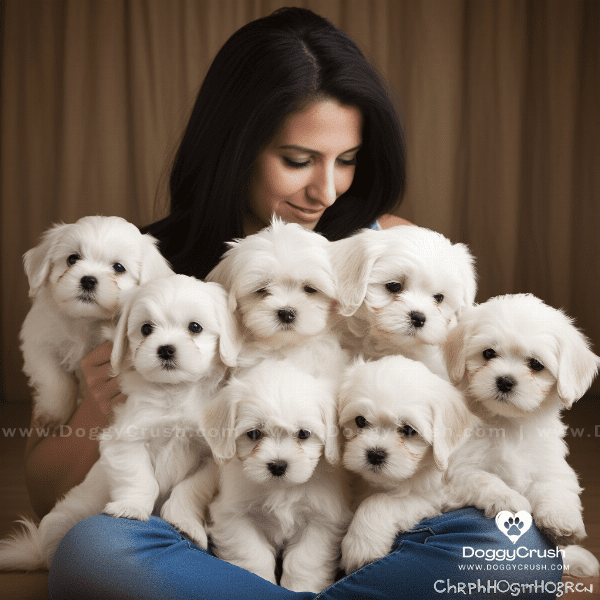
Conclusion: Is a Maltese Dog Right for You?
Maltese dogs are a popular and beloved breed known for their small size, affectionate nature, and hypoallergenic coat. However, they also require regular grooming and exercise, and can be prone to certain health issues. Here are some factors to consider when deciding if a Maltese dog is right for you:
Lifestyle
Maltese dogs are well-suited for apartment living and are a great choice for those with small living spaces. They are also good with children and make great family pets. However, they do require daily exercise and regular grooming, so be prepared to spend time and effort on their care.
Health
While Maltese dogs are generally healthy and long-lived, they can be prone to certain health issues. It’s important to be aware of these issues and to take your dog to the vet for regular checkups and preventative care.
Temperament
Maltese dogs are friendly, affectionate, and eager to please, making them easy to train and a joy to be around. However, they can be prone to separation anxiety and may require extra attention and socialization to prevent behavioral issues.
In conclusion, a Maltese dog can be a great addition to your family if you’re willing to put in the time and effort to care for them properly. Consider your lifestyle, health, and temperament needs when deciding if a Maltese dog is right for you. With proper care and attention, a Maltese dog can provide years of love and companionship.
